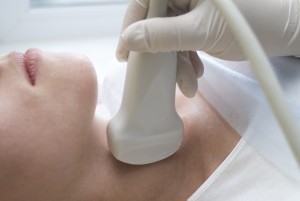How do Thyroid Problems Affect Women?
The small thyroid gland can be the cause of big health complications, especially for women. It is estimated that 20 million Americans suffer from some type of thyroid disease, and women are five to eight times more likely than their male counterparts to experience a thyroid disorder in their lifetime. Women should understand their potential heightened risk factors, and the symptoms and side effects that may indicate a thyroid complication.
About Your Thyroid
The thyroid is a small, butterfly-shaped gland at the base of your neck that produces a hormone that controls a variety of bodily functions. In particular, thyroid hormone impacts how quickly your heart beats, how many calories you burn, digestive functions, muscle control, bone maintenance, and even brain development. When you experience a thyroid problem, and your thyroid produces either too much, or not enough of this hormone, you may experience a variety of complicated health symptoms.
Thyroid Risks for Women
One in eight women will develop a thyroid problem during their lifetime. Women are particularly susceptible to thyroid complications especially after a pregnancy, and after menopause. In general, thyroid problems in women may cause:
- Menstrual period irregularities, including periods that are very heavy, very light, or very irregular. Some women may also experience amenorrhea, which occurs when their menstrual cycle stops for a prolonged period of time.
- Problems with ovulation, which can result in difficulty conceiving.
- Complications during pregnancy that may impact you and your fetus.
- Early menopause.
More complicated thyroid-related health conditions that impact women may include the following:
Hyperthyroidism. A condition in which your thyroid produces an excessive amount of hormone. As a result, many of your metabolic functions speed, including your heart rate. Symptoms may include rapid weight loss, anxiety, increased sweating, irregular periods, fatigue, and difficulty sleeping. Women with hyperthyroidism may have difficulty getting pregnant.
Hypothyroidism. A condition in which your thyroid does not produce enough hormone. As a result, your body’s functions, and in particular your metabolism, decelerate. Symptoms may include feeling fatigued, being overly cold, muscle weakness, weight gain, joint pain, depression, and heavy periods. Women with hypothyroidism may also have difficulty getting pregnant.
Pregnant women are at greater risk for developing thyroid complications, however diagnosing a problem with the thyroid is more difficult during pregnancy because of the hormone changes that occur at that time. Both hyperthyroidism and hypothyroidism can cause complications for mother and baby, so be sure to speak with your OBGYN if you are pregnant and think you may be suffering from a thyroid condition.
Thyroiditis. Inflammation of the thyroid, which sometimes occurs postpartum—affects 10 percent of women. Postpartum thyroiditis is often misinterpreted as postpartum depression, as it sometimes causes feelings of depression and sadness.
Postpartum thyroiditis often occurs in two phases. The first phase occurs one to four months after the baby is born and lasts for one to two months. During this time, women may experience side effects similar to those of hyperthyroidism. The second phase typically starts four to eight months after the baby is born, and may last six to twelve months. During this time, women may experience symptoms similar to that of hypothyroidism. It is important to note that not all women experience both phases of postpartum thyroiditis.
Thyroid Nodules. Affecting four times as many women as men, this condition is marked by swelling in one section of the thyroid gland. Some develop a single nodule in their thyroid, while others develop several nodules. If grown large enough, thyroid nodules may cause difficulty swallowing or breathing.
Goiter. A condition in which the thyroid becomes unusually enlarged, goiter impacts more women than men, and is more common is women before menopause. Symptoms include swelling of the neck, which may cause coughing, or problems swallowing or breathing.
Thyroid Cancer. Like goiter and thyroid nodules, symptoms may include swelling in the neck. Your doctor will conduct tests to determine if a swollen thyroid is the result of cancer. Women are three times more likely than men to develop thyroid cancer. You may be at an even greater risk of developing thyroid cancer if you have been treated with radiation therapy to the head or neck, have a history of goiter, or a family history of thyroid cancer.
For more information on thyroid disorders that could impact you or your baby if you are pregnant of looking to become pregnant, speak to your OBGYN about your risk factors today.
More

